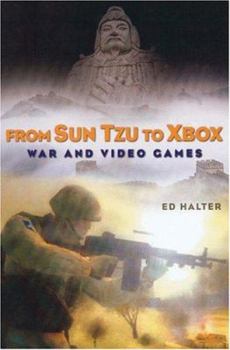From Sun Tzu to Xbox: War and Video Games
Part of an industry that now earns more yearly than the Hollywood box office, video games have entered the forefront of the militarization of popular culture. How did this once-innocent pastime become... This description may be from another edition of this product.
Format:Paperback
Language:English
ISBN:1560256818
ISBN13:9781560256816
Release Date:May 2006
Publisher:Thunder's Mouth Press
Length:364 Pages
Weight:0.75 lbs.
Dimensions:1.1" x 5.5" x 8.2"
Customer Reviews
4 ratings
Engrossing, well-researched.
Published by Thriftbooks.com User , 17 years ago
Mr. Halter's richly informative and highly entertaining exploration of the complex relationship between war and gaming technology sucks you in and doesn't let go until the very last page. War buffs and game enthusiasts alike will find themselves engrossed in this book, but even those of us who approach it with far more limited knowledge will be delighted by the journey into the workings of our own country's war machine.
Interesting perspective on society and war
Published by Thriftbooks.com User , 17 years ago
I picked up Halter's book almost by accident. Although I'm a military historian and wargamer I've never been interested in the video game genre. I was just about to put the book back on the shelf when I realized the book isn't really about video games per se but about how computer wargames have been shaped by war and how computer wargames fit into our culture. Halter argues that from the beginning of the computer age, when primarily military money was used to fund computer research and development, to the present there has been an almost symbiotic relationship between computer games and war. One, in turn, fed the other as experience in war led to more realistic computer games which allowed computer wargames (or simulations, if you prefer) to increase the realism of training. At the same time the knowledge created by the military-industrial complex (to which Halter adds academia) spilled into the entertainment industry. This in turn developed more realistic animation and interactive capabilities that went back into the military's training simulation programs. The book is easy to read, as you'd expect from a journalist, and certainly causes you to think a bit differently about the development of the computer and the entertainment industry as it relates to wargames. The only (small) issues I had was that its focus on the military aspect of computer R & D does not allow a consideration of NASA's impact on computer development. The other issue was that, as a journalist and not an academic, it is not well foot-noted or sourced so you can't go to the sources to verify or validate the information he uses to support his argument. Having said that, Halter certainly presents an interesting and thought-provoking argument and commentary on the relationship between society and the military as it's connected via computer wargames. I wouldn't want to use it as a source for an academic paper, but it certainly presents a thesis that makes for interesting reading.
Great Book about a subject that had to be written about
Published by Thriftbooks.com User , 17 years ago
As a professional in the Modeling and Simulation field I see this book as a great analysis of the mistaken belief that because you can play video games you can fight a war and take on complex social problems. Video games are made for entertainment to satisfy the need for humans to play. If you put the psychology of real human beings into video games, you will not have fun game. Mr. Halter's book give great insight into the problems that have to be overcome to create a "realistic" environment for the training of future soldiers, and what we have so far are not even close. The day we can have a kid walk from the video arcade to a M1 Abrams tank and fight effectively we will have reached our goal. . .but, is that where we want to be?
An eye-opening history
Published by Thriftbooks.com User , 17 years ago
This is a clear-headed and fascinating account of the many complex links between war and video games, some of which I knew something about (America's Army for example) and others I'd never heard about (like the Institute for Creative Technology at the USC, where the Army develops videogames for training). Halter approaches the subject matter with a wry but even-handed manner, and he makes clear that he's an avid game player himself, unlike many political journalists who have taken on similar subjects. He begins in ancient civilizations, runs us through the ways games were used in Victorian times for strategy, and reveals how military needs funded the early hacker culture where video games were invented. About half the book is about the post-9/11 era, however, and the part I knew least about is his final chapter dealing with games about war made by activists and artists. All in all it is a thoroughly entertaining read, and a sharp analysis of the way in which the experience of real war and conflict have seeped into our popular culture for reasons that aren't always obvious.




